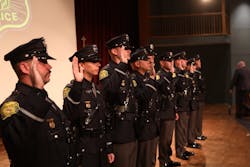No Small Wonders: How L.E. Agencies Recruit and Keep Officers
These hiring and retention hardships have been especially acute for smaller departments, which don’t have the money and resources to compete with larger agencies for the same dwindling pool of candidates. But some small to midsize departments are bucking that trend.
This article appeared in the September/October issue of OFFICER Magazine. Click Here to subscribe to OFFICER Magazine.
OFFICER Magazine spoke with three such agencies to see how they’re weathering keeping positions filled.
Hope Police Department (Arkansas)
Known as the birthplace of President Bill Clinton, Hope has a population of just over 8,500, and its police department is budgeted for two dozen officers. It’s a department that should be the type of small law enforcement agency that’s feeling the sting of a nationwide officer shortage. In fact, it should be the kind of place bristling at being used as a stepping stone for officers to move on to larger departments or paychecks.
“You can fight against it. You’ll lose,” says City Manager J.R. Wilson. “It’s better to embrace that and see yourself as really affecting other parts of the nation with good quality people to get their start with your agency.”Before he was appointed to his current position, which he’s only held for several months, Wilson had been Hope’s police chief since 2003. During his tenure as the city’s top cop, he and the department learned to stop worrying about being the first rung on an officer’s career ladder and love the idea of giving someone a step-up into law enforcement.
“We’re not going to see that as a problem,” says Wilson. “We’re going to see that as encouraging our employee to follow their career goals, that we had a role to play in helping develop that individual and their service to the rest of the nation. … If you can get a person ready for, let’s say, the FBI or the DEA or the ATF or whatever other federal agency or the state police or a large municipality, they want them.
“Let’s say they’re even coming recruiting out of your department. That has a lot to say about the quality of your local department, in my opinion. And we really focus on that.”
Wilson views it as a bit of addition by subtraction, playing the long game—or even the medium game—instead of fixating on short-term gains. As a recruiting tool, he’s found the approach can be more effective than ads and job fairs.
“I think we’ve had agencies tell applicants, ‘Hey, we can’t hire you right now, but if you really want to get a good start, why don’t you consider Hope?’ We’ve had people come and tell us that. And that’s part of our recruiting process,” says Wilson.
“The best recruiting tool you can have is a good department reputation for professionalism and effectiveness. That you’re viewed as doing things right and doing things well and doing things within the Constitution and training your people correctly,” he adds. “If you can build that kind of reputation, you’ll have a lot of agencies that can’t hire somebody right away say, ‘Hey, that’s where I may want to go.’ And we get some people that come to us like that."
That doesn’t mean Hope doesn’t feel pressure when they lose young officers to another agency. Because of its size, even a miniscule amount of attrition can put a strain on the department.
“We have 24 sworn slots, and we have 24 police officers today,” says Wilson. “We’re not behind now. We were behind (a couple officers) earlier this year. But if we get two or three behind, that’s quite a large percentage. It’s a small number, but it’s a large percentage.”
And that’s where the retention side of the personnel equation comes in. During his time as chief, Wilson stressed investing in his officers’ law enforcement education. Officers would go through 40 hours of constitutional law training annually, and an emphasis was put on supplemental training. Not only has the attention to instruction allowed the department to draw from a larger pool of hiring candidates, it’s considered an added benefit for the officers already employed. Wilson also tried to work with officers to accommodate personal time requests, even if it meant spending a little on overtime.
“We’ve got a young man right now. He’s really got a great reputation in our community,” says Wilson. “He’s got a great reputation among the federal agencies because he works in a task force environment with them and everybody’s trying to recruit him. (Arkansas) state police has been over here trying to recruit him. … And I’m not saying they eventually won’t get him. What I’m what I’m saying to you is he says, ‘Look, I’m really happy where I am.’
“And he could go and make 10,000 more dollars simply by saying yes, signing on the dotted line and moving,” he adds. “But he’s happy where he’s at because of the way we’ve trained him, because the way he feels, because of his involvement, because of our culture. And I think that that has been a good point of retention for us.”Marion Police Department (Virginia)
Marion shares similarities with Hope. It’s located in a southern state, with a population under 10,000 (just over 5,600). Although it can’t boast a U.S. President, it is the birthplace of Mountain Dew. And it has a police department that seems to be winning the recruiting and retention battle by employing similar strategies.
Like J.R. Wilson, Marion Police Chief John Clair leans heavily on training not only to make better officers but to create opportunities in hiring. A candidate’s character and intangibles can be weighed more heavily because Clair knows there’s a system in place to turn a new hire into a successful officer.
“I’m hiring all for customer service quality, all for personality. How they seem in terms of character. And you know what? We’ll teach the rest,” says Clair. “Because consider this: In the past, when we hired for skill that way, we fundamentally didn’t trust our training programs. Think about that. If we fundamentally trust our training programs, then in many ways we should be able to take almost anyone and make them a police officer. Now, there are some people who believe that there are certain intrinsic kind of indefinable (qualities) that mean you can be a police officer I would argue they’re just talking about character and personality.”
“We do offer a lot of training. … We want you to find what you like and we want you to get really, really good at it,” he adds. “And that seems to work (for retention), because then the officers get a sense of ownership.”
Trusting the training has meant the department can expand its candidate pool to include individuals who might not be traditional law enforcement material and let the agency go “looking for value in places where we may have otherwise ignored it and messaging in that direction,” the chief says. Although the department doesn’t do a lot of advertising, its main campaign features an officer holding a young girl and portrays the agency as a family friendly workplace.
“We’re saying Marion is the kind of place to raise a family. Marion Police Department is the kind of place to work if you have a family. I don’t think you see messaging like that,” Clair says of the ad. “And it’s not just for fun. We mean it. … This resulted in the hire of a single father with two children. He was getting out of the military and was looking to get into law enforcement. He was generally from the area, and he saw that picture and he thought, huh. He saw himself in that picture, and we ended up hiring him, and he’s been a great addition to the department.”
“In the past, you’d have thought, ‘Single father, two kids. Man, that’s going to be tough.’ And the guy ends up being phenomenal,” he adds. “Are there certain things that need to be done to help accommodate his family situation? Yep. Are we going to do them? Yep. It’s that simple.”
Clair admits that the department’s hiring and retention benefits from cultural factors. People from the area tend to want to stay there, he says, and that’s meant the agency can recruit in its backyard. But an opening isn’t posted locally with the hopes that candidates will beat a path to the department’s front door.
“We go in the community, and we scout and then we go out there, we talk to the people,” says Clair. “We give them the five-tool baseball talk. You can hit, you can run, you can catch, you can throw, and you can hit with power. Come play for Marion, man. We’ve heard a lot about you. We think you got a lot going on. Have you ever thought about a career in law enforcement? We don’t wait for them to apply. We go find them.”
Frederick Police Department (Maryland)
With a population of around 80,000, and a police force of roughly 150 officers, Frederick is a sprawling metropolis compared to Hope and Marion. Even though Police Chief Jason Lando doesn’t consider the department a “stepping stone” agency, he knows it faces heavy competition for officer applicants given its location 50 miles or fewer from Baltimore, Washington, D.C., Virginia, West Virginia and Pennsylvania. Yet it’s not suffering because of this concentration of local, state and federal agencies.
“When you look at the people we lose, we’re not losing people to outside agencies. We’re gaining people from outside agencies, but we’re not losing people to outside agencies,” says Lando, adding that the department loses officers to retirement or unique circumstances, such as moving because a spouse has gotten a job elsewhere.
“I think retaining people speaks a lot to the culture here at the agency,” he says. “I have found it to be pretty much like a family atmosphere. We do a lot of stuff to take care of our employees and probably more so than anything else, the community support here is something that you just don’t see. … It’s really impressive.”
Before the department can retain officers, it needs to attract them. When Lt. Joe Hayer took on his position in the support service division with personnel and training under it in 2014, he began asking a lot of questions about why they recruited the way they did. Those questions, as well as its demographic and recruiting audit required by the Commission on Accreditation for Law Enforcement Agencies (CALEA), led to the department getting “really intentional” with how it recruited. That meant paring away things that weren’t working, such as job fairs that historically had proved ineffective.
“We know in order to stay regionally competitive, we need to beat out some of those bigger agencies by being nimble in the way that we recruit,” says Hayer, who has spoken about recruiting around the country.
One of the most innovative creations to come out of this self-examination were applicant-sharing partnerships with smaller agencies. The process works like this: A candidate might apply to the Frederick Police Department with good qualifications but who might not be quite ready for the agency. The applicant might then be referred to a smaller department in the region, giving that agency an opportunity to hire a solid candidate without doing much of the heavy lifting.
“They get a qualified applicant, they may hire them, they’ll get several years, and hopefully, they’ll come back as a lateral applicant to us with three, four or five years of experience, and we can hire them and hit the ground running,” says Hayer, who hasn’t heard of this being done elsewhere.
“Hopefully, like a boomerang, they’ll come back to work for us one day,” he adds. “Hasn’t worked all the time. Some agencies have benefited. We were just talking about somebody who was passed over for some traffic related issues they had on their background. Another agency picked them up, took a chance on them, and they’ve been working there ever since, which is a win-win for us and the profession, really.”
Arguably, Frederick’s best recruiting tools are its officers, says Lando. The department has adopted an all-hands approach to recruiting, and it’s something the chief thinks his officers fully embrace.“(Officers) are our best recruiter,” he says. “And one of the things I’ve noticed is a lot of the folks that we get here, they talk about how they heard about the agency from an FPD employee. … The recruiting is a team effort, and I do think our officers and our civilian staff are our best billboards.”




